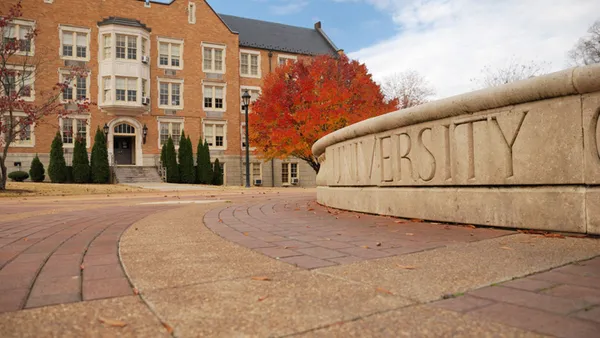Dive Brief:
- Colleges' current system for adjunct and contingent faculty leaves employees underpaid and with little job security, conditions that worsened during the pandemic, the American Federation of Teachers has found.
- A quarter of adjunct faculty report an annual salary that puts them below the federal poverty line, according to survey data released in February by the AFT, a union with 240,000 higher education members, including contingent faculty and graduate employees. In the midst of the pandemic, less than half of survey participants reported access to employer-provided health insurance, and nearly 20% said they were on Medicaid, the government health program for low-income people.
- The report advocates for passage of the social safety net portions of the stalled federal Build Back Better Act as stand-alone bills or as part of Higher Education Act reauthorization.
Dive Insight:
The ratio of tenure-affiliated to nontenured academic employees has shifted dramatically over the past several decades. Forty years ago, 70% of faculty were tenured or on a tenure track, according to the AFT. Now, 75% of college faculty are not eligible for tenure, and 47% are employed only part time.
The idea that adjunct faculty are professionals who teach a class or two outside of their regular full-time job is outdated, according to AFT President Randi Weingarten.
"Adjuncts are cobbling together four or five teaching gigs in an attempt to make a living," she said. "The people who are actually responsible for making postsecondary education happen are in a very precarious place."
Contingent and adjunct faculty make up about 75% of current teaching staff, compared to about 25% four decades ago, according to Weingarten.
"Colleges are moving more and more courses from full-time tenured faculty to contingent and adjunct faculty. And the latter is paid really terribly," said Weingarten.
The AFT polled 1,883 contingent faculty from public and private, two-year and four-year colleges. Some 25% of respondents earn less than $25,000 annually, and only 20% said they could comfortably cover their basic monthly expenses.
The report surveyed adjunct faculty between May 21 and Aug 18, 2020. During this time, many respondents said they were pivoting to hybrid and virtual teaching due to COVID-19, often with little support. Over 38% said their employers did not provide adequate training or information on how to teach online during an emergency. The lack of guidance coincided with concerns over continued employment. Over 65% of participants said part-time faculty at their college did not have job security term to term.
The tenure track positions that do remain have become a political talking point. In Texas, the lieutenant governor said he wants to end tenure at all of the state's public universities.
That would be a mistake and tremendously hurtful to all academic employees, Weingarten said.
"Intellectual capital is one of the things that has made the United States great in the past," she said. "Tenure enables people to take risks and try new things. Taking it away would be terrible in terms of creativity and innovation."














